August 30, 2017
Melissa Hanham, Catherine Dill, Daniel Salisbury, P. Alex Kynerd and Raymond Wang
Occasional Paper #32
Read the full Occasional Paper #32:
Taiwan’s Export Control System: Overview and Recommendations
Executive Summary

This report provides an overview and assessment of Taiwan’s export control program, with a focus on strategic high-tech commodities (SHTC). It highlights Taiwan’s global position as a major port for both shipping and dual-use exports, identifying the key legislation and organizations that address SHTC exports. It thoroughly examines the key organizations, legislation, licensing procedures, and challenges within Taiwan’s export control system.
Overall, Taiwan has a strong, modern export control system, and any deficiencies are similar to other jurisdictions of the same size in terms of trade and shipping. Nonetheless, Taiwan’s isolation in the international community continues to make it a target for illicit trade, including financing of items related to weapons of mass destruction (WMD).
Using open-source data, this report identifies twenty-five export-control cases involving Taiwanese persons and/or entities. All of these cases were prosecuted in Taiwan or abroad. In an attempt to identify unprosecuted cases, researchers incorporated publicly available data, including the Panama Papers. The report finds no evidence of unprosecuted illicit WMD-related trade.
Despite its international isolation, Taiwan has an opportunity to become a leader in safe international trade. By fully embracing export control and proliferation finance laws and enforcement, Taiwan could become a natural hub for export controls. To this end, this report recommends:
- The United States and Japan continue their capacity building, information exchange, and related export control and anti-proliferation finance activities.
- Taiwan should continue to vigilantly engage in industry outreach, and monitor transshipment, and brokering risks.
- China and Taiwan should form an informal channel for discussion of export controls at the track one-and-a-half level.
- The International Police Organization, or INTERPOL, should grant Taiwan observer status.
- Taiwan should tighten criminal and civil penalties for export-control violations.
- Taiwan should improve its anti-money laundering and proliferation finance laws and enforcement.
